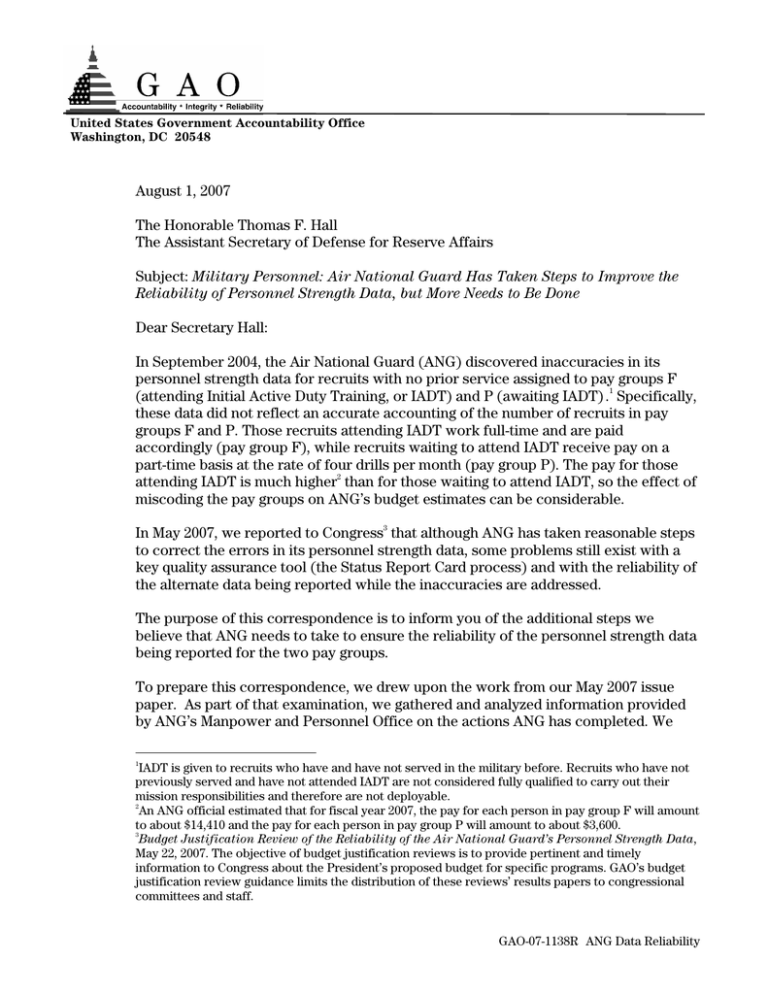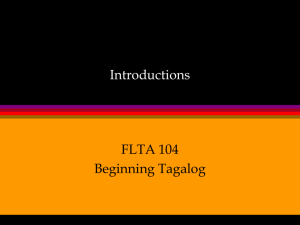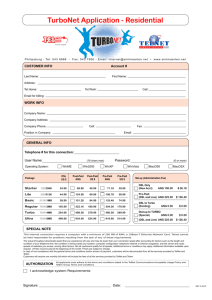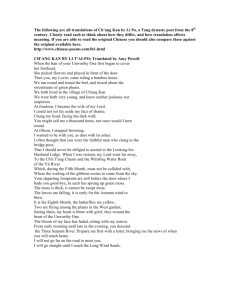August 1, 2007 The Honorable Thomas F. Hall
advertisement

United States Government Accountability Office Washington, DC 20548 August 1, 2007 The Honorable Thomas F. Hall The Assistant Secretary of Defense for Reserve Affairs Subject: Military Personnel: Air National Guard Has Taken Steps to Improve the Reliability of Personnel Strength Data, but More Needs to Be Done Dear Secretary Hall: In September 2004, the Air National Guard (ANG) discovered inaccuracies in its personnel strength data for recruits with no prior service assigned to pay groups F (attending Initial Active Duty Training, or IADT) and P (awaiting IADT) .1 Specifically, these data did not reflect an accurate accounting of the number of recruits in pay groups F and P. Those recruits attending IADT work full-time and are paid accordingly (pay group F), while recruits waiting to attend IADT receive pay on a part-time basis at the rate of four drills per month (pay group P). The pay for those attending IADT is much higher2 than for those waiting to attend IADT, so the effect of miscoding the pay groups on ANG’s budget estimates can be considerable. In May 2007, we reported to Congress3 that although ANG has taken reasonable steps to correct the errors in its personnel strength data, some problems still exist with a key quality assurance tool (the Status Report Card process) and with the reliability of the alternate data being reported while the inaccuracies are addressed. The purpose of this correspondence is to inform you of the additional steps we believe that ANG needs to take to ensure the reliability of the personnel strength data being reported for the two pay groups. To prepare this correspondence, we drew upon the work from our May 2007 issue paper. As part of that examination, we gathered and analyzed information provided by ANG’s Manpower and Personnel Office on the actions ANG has completed. We 1 IADT is given to recruits who have and have not served in the military before. Recruits who have not previously served and have not attended IADT are not considered fully qualified to carry out their mission responsibilities and therefore are not deployable. 2 An ANG official estimated that for fiscal year 2007, the pay for each person in pay group F will amount to about $14,410 and the pay for each person in pay group P will amount to about $3,600. 3 Budget Justification Review of the Reliability of the Air National Guard’s Personnel Strength Data, May 22, 2007. The objective of budget justification reviews is to provide pertinent and timely information to Congress about the President’s proposed budget for specific programs. GAO’s budget justification review guidance limits the distribution of these reviews’ results papers to congressional committees and staff. GAO-07-1138R ANG Data Reliability reviewed applicable guidance4 to determine if it was adequate to ensure greater accuracy by the local units in updating the student records for recruits with no prior service to ensure that they were being correctly categorized into either pay group F or P. We reviewed documentation for the three systems change requests, including evidence that the systems change requests had been implemented, to determine whether these changes would automate processes currently being performed manually by the local units that were resulting in the data reliability errors. We also reviewed the statistical analysis software code used by ANG to produce the Status Report Card to determine the effectiveness of this mechanism in identifying errors and to assess the reliability of the Status Report Cards being generated. We reviewed a spreadsheet that ANG had prepared that showed the difference between the data being reported in the Reserve Component Common Personnel Data System for the actual end strength for pay groups F and P for fiscal year 2006 and what ANG officials described as comparable data for fiscal year 2006 from alternate sources (e.g., the Military Personnel Data System). Because this correspondence focuses on steps taken by ANG, we did not interview officials from the Air Education and Training Command, which owns and manages the alternate data reported. In conducting this work, we held discussions with cognizant officials from ANG and the Office of the Assistant Secretary of Defense (Reserve Affairs) to confirm the results of our work and to obtain explanations for any discrepancies noted. Agency officials concurred with our findings. We relied on the work described above, which we performed to produce our May 2007 issue paper, as we wrote this correspondence. This work was performed from June 2007 through July 2007 under the statutory authority of the Comptroller General to conduct evaluations on his own initiative and in accordance with generally accepted government auditing standards. ANG Has Taken Steps to Correct Data Errors, but Additional Steps Are Needed to Ensure Data Reliability ANG has taken reasonable steps to correct the errors in its personnel strength data for recruits with no prior service; however, there are additional steps ANG needs to take to ensure the reliability of the personnel strength data for the pay groups. In January 2006, ANG established its Status Report Card process to monitor the number of errors that occurred at the local unit level in updating the student status codes for training that affects the pay group (F or P). The Status Report Card includes data on the number of errors detected in each local unit’s records for recruits in pay groups F and P, and assigns each unit a grade ranging from A through F, with A representing the least number of errors and F representing the greatest number of errors. ANG officials stated that this process has had a positive impact on the units’ data accuracy, since the total number of errors has declined. ANG reported that the number of errors at the inception of the Status Report Card process was 1,431 and that as of February 2007 the number was 531. 4 Air National Guard, Assignments Within the Air National Guard, Air National Guard Instruction 362101, June 11, 2004; Air National Guard Directorate of Personnel and Training, Guide for Student Flight Initial Classification Actions and Training Status Codes, April 25, 2005; Air Force Instruction 36-2101, Classifying Military Personnel (Officer and Enlisted), March 7, 2006; and Air Force Instruction 36-2201 (Volume 3), Air Force Training Program On The Job Training Administration, December 20, 2006. Page 2 GAO-07-1138R ANG Data Reliability While these steps may have reduced errors in the data, ANG still cannot ensure the reliability of its personnel strength data because it has not followed federal internal control standards. Federal internal control standards state that documentation should exist and be readily available for review by others to allow an independent evaluation. 5 Federal internal control standards also require that data control activities, such as edit checks, verifications, and reconciliations, be conducted and documented to ensure the reliability of the data.6 However, ANG has not (1) documented the process, so it cannot ensure that it is operating as intended; (2) established controls to ensure that data fields in the statistical analysis software code that require updates are being updated before the Status Report Card is generated each month; or (3) ensured the reliability of the alternate data used to generate the Status Report Card. In addition, ANG has not taken steps to ensure the reliability of the alternate personnel strength data being reported7 until the errors from the official data source (Reserve Component Common Personnel Data System) were corrected.8 ANG officials stated that they did not validate the alternate data being reported in the interim nor confirm that internal control procedures had been established to ensure the reliability of these data. The Branch Chief for Strength Management and Data Analysis stated that the focus was on implementing fixes to solve the problem, not on adequately documenting the Status Report Card process. This official said that the process lacks control activities, such as edit checks, because the available staff did not understand that they needed to establish these controls or how to do so. The official explained that ANG did not verify the alternate data because it is only an “end user,” and the data are owned and managed by the Air Education and Training Command. Nonetheless, these officials are using these alternate data to determine the accuracy of the Reserve Component Common Personnel Data System data for pay groups F and P. Moreover, the official said that ANG did not have the means or the understanding to test the reliability of the alternate data. This official also stated that the Status Report Card process, suspended in March 2007, will resume after the Student Flight Guide has been revised to reflect the impact of the systems change requests and the process has been reviewed to ensure that it is an acceptable means for measuring performance. Until ANG documents how the Status Report Card process is intended to perform, its effectiveness as a monitoring tool is questionable. Likewise, unless ANG validates its alternate data, it cannot reasonably assure the users of the data that they are reliable. As a result, decision makers within the Department of Defense and Congress may not have accurate and complete information to make informed decisions. 5 GAO, Standards for Internal Control in the Federal Government, GAO/AIMD-00-21.3.1 (Washington, D.C.: November 1999). 6 GAO/AIMD-00-21.3.1 and GAO, Assessing the Reliability of Computer-Processed Data, GAO-02-15G (Washington, D.C.: September 2002). 7 ANG reported alternate data in its Official Guard and Reserve Manpower Strength and Statistics report for pay groups F and P for fiscal years 2005 and 2006. 8 The Reserve Component Common Personnel Data System is the official data source for manpower planning, strength accounting, and budgeting for reserve components. Page 3 GAO-07-1138R ANG Data Reliability Recommendations for Executive Action To ensure that ANG has reliable personnel strength data for these pay groups, we recommend that you take steps to ensure that ANG (1) documents the Status Report Card process, (2) establishes needed controls to ensure that data fields are updated before the Status Report Card is generated each month, and (3) in conjunction with the owners of the data (e.g., Air Education and Training Command), verifies the reliability of the data used to generate the Status Report Cards and the alternate data being reported. We will make copies of this correspondence available to others upon request. In addition, the correspondence will be available at no charge on GAO’s Web site at http://www.gao.gov. If you have any questions or wish to discuss this material further, please contact me at (202) 512-5559 or stewartd@gao.gov. Contact points for our Offices of Congressional Relations and Public Affairs may be found on the last page of this correspondence. GAO staff who made major contributions to the correspondence are listed in enclosure I. Sincerely yours, Derek B. Stewart Director, Defense Capabilities and Management Enclosure Page 4 GAO-07-1138R ANG Data Reliability Enclosure I GAO Contact and Staff Acknowledgments GAO Contact Derek B. Stewart (202) 512-5559 or stewartd@gao.gov Acknowledgments In addition to the contact above, Cynthia Jackson, Assistant Director; Renee S. Brown; Grace A. Coleman; Julia C. Matta; J. Paul Newton; Rebecca Shea; and Dale O. Wineholt made key contributions to this correspondence. (351059) Page 5 GAO-07-1138R ANG Data Reliability This is a work of the U.S. government and is not subject to copyright protection in the United States. The published product may be reproduced and distributed in its entirety without further permission from GAO. However, because this work may contain copyrighted images or other material, permission from the copyright holder may be necessary if you wish to reproduce this material separately. GAO’s Mission The Government Accountability Office, the audit, evaluation and investigative arm of Congress, exists to support Congress in meeting its constitutional responsibilities and to help improve the performance and accountability of the federal government for the American people. GAO examines the use of public funds; evaluates federal programs and policies; and provides analyses, recommendations, and other assistance to help Congress make informed oversight, policy, and funding decisions. GAO’s commitment to good government is reflected in its core values of accountability, integrity, and reliability. Obtaining Copies of GAO Reports and Testimony The fastest and easiest way to obtain copies of GAO documents at no cost is through GAO’s Web site (www.gao.gov). Each weekday, GAO posts newly released reports, testimony, and correspondence on its Web site. To have GAO e-mail you a list of newly posted products every afternoon, go to www.gao.gov and select “Subscribe to Updates.” Order by Mail or Phone The first copy of each printed report is free. Additional copies are $2 each. A check or money order should be made out to the Superintendent of Documents. GAO also accepts VISA and Mastercard. Orders for 100 or more copies mailed to a single address are discounted 25 percent. Orders should be sent to: U.S. Government Accountability Office 441 G Street NW, Room LM Washington, D.C. 20548 To order by Phone: Voice: TDD: Fax: (202) 512-6000 (202) 512-2537 (202) 512-6061 Contact: To Report Fraud, Waste, and Abuse in Federal Programs Web site: www.gao.gov/fraudnet/fraudnet.htm E-mail: fraudnet@gao.gov Automated answering system: (800) 424-5454 or (202) 512-7470 Congressional Relations Gloria Jarmon, Managing Director, JarmonG@gao.gov (202) 512-4400 U.S. Government Accountability Office, 441 G Street NW, Room 7125 Washington, D.C. 20548 Public Affairs Paul Anderson, Managing Director, AndersonP1@gao.gov (202) 512-4800 U.S. Government Accountability Office, 441 G Street NW, Room 7149 Washington, D.C. 20548 PRINTED ON RECYCLED PAPER





